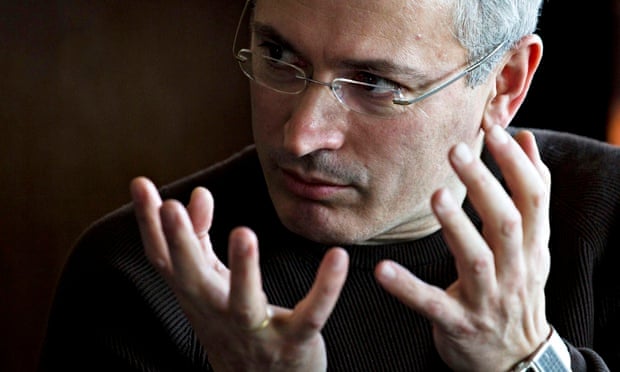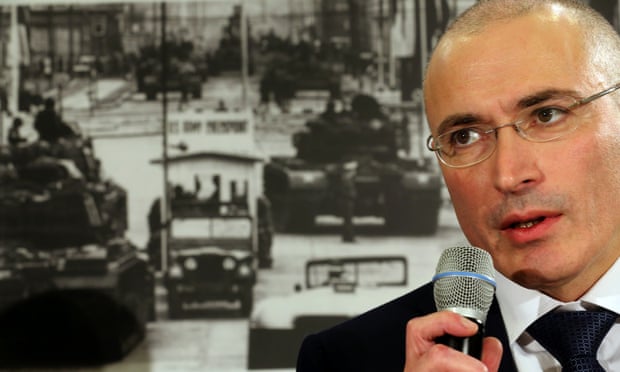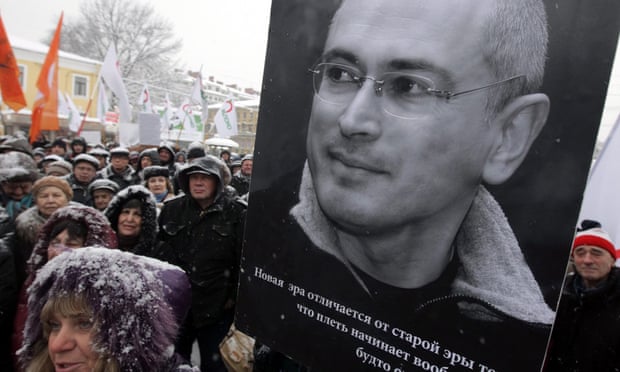Mikhail Khodorkovsky on life after prison and Russia after Putin

He was Russia’s richest man, and then its most high-profile prisoner. Now, a year after Vladimir Putin pardoned him and released him from jail, Mikhail Khodorkovsky is living in Zurich and plotting the downfall of the man who put him behind bars for a decade.
“I will work to make sure the regime in Russia changes,” he says. “The question is: am I prepared to go all the way? And yes, I am prepared to go all the way.”
The Guardian’s meeting with Khodorkovsky takes place in a handsome but functional five-story building in central Zurich which serves as his office. He appears with a big pair of headphones round his neck and a black rucksack over his shoulders. The top-floor views of the River Limmat and the spires of central Zurich are a far cry from what he had to get used to for a decade.
“When I look back now, I can’t believe that a year ago I was in [prison] and didn’t think I’d ever be set free,” he says, pausing to eat slices of dried banana from a bowl on the table. “I thought there would be a third case.”
Putin announced that he planned to free Khodorkovsky on the sidelines of his marathon pre-Christmas press conference last December. It came as a surprise: there had been murmurings that a third criminal case was being prepared in order to keep the former oligarch locked up. But, beneath a cloak of secrecy, Khodorkovsky was whisked from his prison cell that night and put on a plane to St Petersburg, where he switched planes on the tarmac to a waiting aircraft that flew him to Berlin.
Khodorkovksy says he promised Putin three things in a handwritten letter asking to be freed so he could see his mother, who was terminally ill: that he would leave Russia to spend time with his family, would stay away from politics, and would not attempt to win back his shares in Yukos – his dismantled oil company – or get involved in any court cases.
Until late in the summer, when his mother died, he was indeed silent, but now he has set up a foundation called Open Russia and has been making political statements.
“It’s true I don’t want to get involved in politics,” he claims. “I want to support people who share my values, and that’s what I’m doing. In Russia, they call that politics, OK, well fine,” he says. He claims that by “changing the regime” he does not necessarily mean Putin – in the unlikely event that Putin decided tomorrow he wanted to completely change his style of rule, Khodorkovsky says he would be happy to work with him. He also insists he personally has no burning desire to be president: “I can’t really say that I am really interested in doing that, but if people ask me, then yeah, OK, I’m ready.”

But he surely knows that suggesting, however obliquely, that he might like to be president is not going to go down well with Putin. The last time Khodorkovsky dabbled in politics, he was arrested and spent the next 10 years in prison. While there is no doubt that most of the people who got rich in 1990s Russia committed a multitude of sins, there was also little doubt that the proceedings against Khodorkovsky were political. Is he really ready to take on the Kremlin again?
His office in Zurich is just a few blocks from the house where Vladimir Lenin lived for a year until April 1917. The Bolsheviks at the time were a marginal group with little support in Russia, and Lenin’s pontificating from Switzerland seemed something of an irrelevance. Within a few months of being dispatched to Russia by train, however, Lenin had deposed the provisional government and become the new leader of Russia.
In modern times, however, the character with most parallels to Khodorkovsky is Boris Berezovsky. Both men grew fabulously wealthy through the dubious and unjust privatisation process in the 1990s, and both were close to the Kremlin. Berezovsky, who was Putin’s political mentor, fell out with his protégé and fled to London, where he died in an apparent suicide in 2013.
“To turn into someone like Berezovsky, as well as the physical circumstances you also need to have the internal predisposition to this kind of situation. He was a real opportunist, whereas I am more of a pragmatist. I am used to running businesses. I am used to setting realistic goals and achieving them. Sometimes they are major goals, sometimes minor ones, and sometimes achieving them takes longer than I thought. But they are always pragmatic goals, pragmatic steps and carefully planned movement towards the goal.”
To this end, Khodorkovsky says he spent most of his time in prison thinking about what Russia should look like after Putin.
“It was very difficult over 10 years to take part in all these processes with predetermined results, in all these little insults, which happened later on in the camps. So I gave myself intellectual exercises, and set to work thinking about what mechanism there should be for the transition period. Where we need to get to is clear enough: a state governed by the rule of law. Full stop.”

On the specifics, however, he is vague. How a new government would come into place – through revolution or negotiation – he declines to say. Whether there should be criminal prosecution for current regime figures, he also says should be decided later.
“We will discuss this a lot, we have time. I think there will be a lot of discussion.”
He talks about a transition period of two or three years in which he would be prepared to be president, but again, the mechanics of this are vague.
Even in sleepy Zurich, the Kremlin is never far away. The Russian special services make it clear they are monitoring Khodorkovsky’s communications, he says: if he asks someone to take a document to Moscow, that person will stopped at customs and subjected to a search. At his public events, there are often uninvited guests.
“You can tell them by the questions. Sometimes they introduce themselves, sometimes they don’t. Sometimes the local guys tell me: ‘Ah, your lot have come again’. They know everyone here, it’s a small country.”
He is not visibly followed, he says, but is aware of the risks of vocal opposition: “I understand perfectly well that if Putin gives the order to have me removed, I will be removed. What else is there to say? But given I’m his personal opponent, it would be a very public gesture. I don’t know how much that would stop him, when you think about what has happened in Ukraine. But let’s hope that some kind of rules of the game remain in force.”
Khodorkovsky speaks with quiet determination, but also a studied indifference. He says he has neither the time, nor the desire to continue his prison diaries, and insists he has no dreams, no flashbacks to his time in jail. “I’m completely calm. It happened, so, whatever. Time to move on.”
It is nice to eat good food, he says, but insists he was not that bothered by prison fare. “I’m a pretty easy-going person. Whatever you feed me, I’m fine. So I didn’t really suffer from prison food, although really you could only call it ‘food’ in the sense that it had calories in it.”
As for things which surprised him when he emerged from the electronics-free vacuum that is Russian prison, Khodorkovsky says most things he understood, but after a decade locked up, the power of social media had been the biggest shock.
“I read 200 pages a day, so I had a theoretical understanding of everything that was happening, even of iPhones. The phenomenon of social media came as a surprise to me, though. I knew that these things exists, but to understand the influence it has had on humankind, you have to really feel that.”
He claims that one advantage he has gained from his time in prison is patience.
“Prison taught me that time does not have as much significance as we think. Just because something didn’t happen today doesn’t mean it won’t happen tomorrow,” he says. “There is no rush. Ten years is not a long time. For me, 2024 is not a long time away. There is a plan for these years. And if everything will happen the right way, I will implement it.”

No comments:
Post a Comment